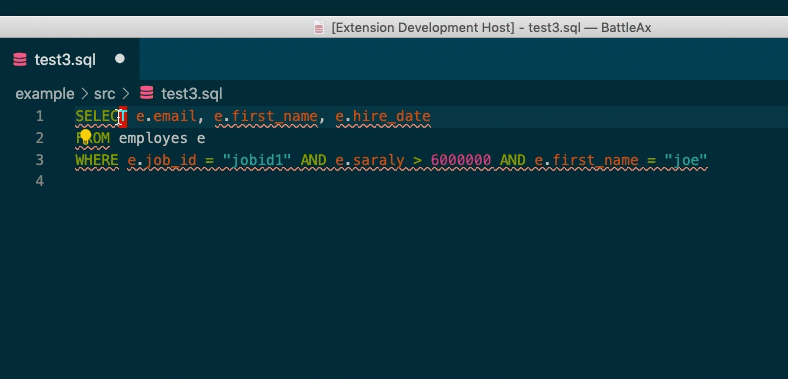Lint tool for SQL
You can install SQLint using npm:
$ npm install sqlint --save-devOr using yarn:
$ yarn add sqlint -DYou can use sql-language-server to use SQLint on your editor.
Example
$ sqlint .
Options:
Options:
--version Show version number [boolean]
-h Show help [boolean]
--config, -c Configuration file path [string]
--output, -o Specify file to write report to [string]
--format, -f Select a output format
[string] [choices: "stylish", "json"] [default: "stylish"]
--stdin Lint code provide on <STDIN> [boolean] [default: false]
--fix Automatically fix problems [boolean] [default: false]
Use stdin example:
$ cat ./test/cli/fixtures/lint/errorSql.sql | sqlint --stdin
--fix option will work to try to fix as many problems as possible.
example:
$ sqlint --fix .
{
"rules": {
"align-column-to-the-first": "error",
"column-new-line": "error",
"linebreak-after-clause-keyword": "error",
"reserved-word-case": ["error", "upper"],
"space-surrounding-operators": "error",
"where-clause-new-line": "error",
"align-where-clause-to-the-first": "error",
}
}Personal configuration file is located on ~/.config/sql-language-server/.sqlintrc.json.
It'll be applied when it can't find a project configuration file.
Project configuration file is located on ${YOUR_PROJECT_ROOT}/.sqlintrc.json.
Rule shoud be set the ruleID and one of these values:
- "off" or 0
- "warn" or 1
- "error" or 2
Some rules have option that you can modify checking behaviour. For kind of those rules, you can set Array value that the first element is error level and the second element is option value.
"rule-id": ["error", "option"]
Option value's type depends on each rules. Please check each rules description to set it.
We're always finding new rules to add. If you have any prefer rules you want feel free to open a issue to discuss.
Align all columns to the first column on their own line.
Good
SELECT
foo.a,
foo.b
FROM
fooBad
SELECT
foo.a,
foo.b
FROM
fooColumns must go on a new line.
Good
SELECT
foo.a,
foo.b
FROM
fooBad
SELECT
foo.a, foo.b
FROM
fooRequire linebreak after SELECT, FROM, WHERE keyword.
Good
SELECT
foo.aj
FROM
foo
WHERE
foo.a > 1Bad
SELECT foo.aj
FROM foo
WHERE foo.a > 1Reserved word's case should be unified by upper or lower.
Option: "upper" | "lower" (default: "upper")
Good
SELECT * FROM fooBad
select * FROM fooSpaces around operators.
Option: "always" | "never" (default: "always")
Good("always")
SELECT *
FROM foo
WHERE foo.a > 1
OR foo.b >= 2
AND foo.c = true
OR foo.d <> falseGood("never")
SELECT *
FROM foo
WHERE foo.a>1
OR foo.b>=2
AND foo.c=true
OR foo.d<>falseBad
SELECT *
FROM foo
WHERE foo.a > 1
OR foo.b>=2
AND foo.c=true
OR foo.d <> falseMultiple where clause must go on a new line.
Good
SELECT foo.a, foo.b
FROM foo
WHERE
foo.a = 'a'
AND foo.b = 'b'Bad
SELECT foo.a, foo.b
FROM foo
WHERE
foo.a = 'a' AND foo.b = 'b'Where clauses must align to the first clause.
Good
SELECT foo.a
FROM foo
WHERE foo.a = 'a' AND foo.b = 'b' AND
foo.c = 'c' AND
foo.d = 'd'Bad
SELECT foo.a
FROM foo
WHERE foo.a = 'a' AND foo.b = 'b' AND
foo.c = 'c' AND
foo.d = 'd'Where clauses must align to the first clause.
Good
SELECT foo.a
FROM foo
WHERE foo.a = 'a' AND foo.b = 'b' AND
foo.c = 'c' AND
foo.d = 'd'Bad
SELECT foo.a
FROM foo
WHERE foo.a = 'a' AND foo.b = 'b' AND
foo.c = 'c' AND
foo.d = 'd'As is always required to rename a column name.
Good
SELECT
employees.name AS employee_name,
COUNT(tasks.id) AS assigned_task_count
FROM
employees LEFT JOIN tasks
ON employees.id = tasks.idBad
SELECT
employees.name employee_name,
COUNT(tasks.id) assigned_task_count
FROM
employees LEFT JOIN tasks
ON employees.id = tasks.id

